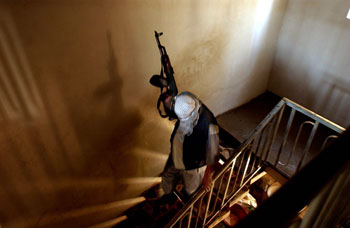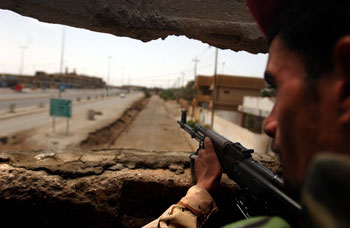Fallujah is under siege, there is no way out and no way in. At one of the several American checkpoints on the outskirts of the city, some local families gather as reports spread around that fighting has eased. Almost a month has passed since most families fled the city and overstayed their welcome with relatives and friends in Baghdad and nearby villages. They just want to go home. Today ten families are allowed in and miraculously the American soldiers at the checkpoint allow me to follow them in my car. I'm convinced there is another checkpoint not far ahead but suddenly Abu Ibrahim, my friend and driver, tells me we are in.
The city is completely deserted, only the distant sound of gunfire resonates. As we slowly drive ahead I look up toward the roof of buildings and see sandbags, probably sniper positions. I ask Abu Ibrahim if he thinks they are American or rebel positions. "It does not matter they both shoot." Abu Ibrahim feels confident we can at least get to the old Governor's compound where Al Arabiya and Al-Jezeera are based. As far as I know they are the only two news channels allowed in the city by the Muhaheddin. On the way there I pass many destroyed homes that look like they've been hit with heavy artillery. Further ahead a lone Iraqi soldier is standing at a desolate intersection. He seems happy to see me and allows me to quickly photograph him.
 |
A lone Iraqi Army Soldier, Fallujah Newsday Photo/Moises Saman |
Inside the Governor's compound Abu Ibrahim runs into an old friend of his, a well-known teacher in Fallujah who has taken arms along with some of his neighbors to "defend his city from the American invaders." He explains that the worst hit area of the city is Jolan, a poor district on the northern part of the city where most of the Mujaheddin are still holding their positions and heavy battles have left the neighborhood partially in ruins. I ask if we can go.
Based on his friendship with Abu Ibrahim and conscious of the kind of pictures I am after, the teacher agrees to introduce us to a group of local fighters in Jolan, but he needs time, at least a day. It is almost 6pm, the heavy shooting seems to always start as the sun goes down. After consulting with Abu Ibrahim we decide that today this is as far as we get.
 |
Iraqi insurgent fighter in the Jolan neighborhood of Fallujah Newsday Photo/Moises Saman |
The next morning we meet the teacher at the home of his cousin. He is helping him clear the rubble of what used to be his livingroom, now completely destroyed after being hit, he says, by fire from an American helicopter. The teacher grabs his automatic rifle and jumps in the front seat of our car. We are to meet another of his friends, the head of a small cell of fighters controlling a couple of neighborhood blocks in Jolan. As we drive into Jolan the scene changes dramatically. Dozens of heavily armed Mujaheddin, their heads wrapped in kaffiyehs, are everywhere. We have to stop on every corner to check in with the local crew controlling the street. At one of these nerve-wracking stops a crowd of fighters surround the car, most of them staring at me through the car window. After some talking by the teacher one of the fighters gets in the car and sits next to me. Now we are good to go.
 |
Iraqi Sniper Newsday Photo/Moises Saman |
We finally arrive at a house on the northern edge of Jolan. The house has been severely damaged by fire. I am told to wait in the car with Abu Ibrahim as the rest of the passengers go into the house. Five minutes later we are waved in. Inside the house the walls are pierced with hundreds of bullet holes. Carefully I am led upstairs where a fighter with a sniper rifle crouches next to a wall. I peek out the window and see some railroad tracks. I am told the nearest Marine position is just on the other side of the tracks, about 400 meters away. After about 15 minutes photographing the scene Abu Ibrahim tells me it is time to leave.
On the way out the teacher tells me I am welcome to come back as long as I bring a CD back with some of the pictures.
Moises Saman is a Newsday photographer whose assignments have taken him to the war in Kosovo, Afghanistan the Middle East and recently to the Iraq
war where he is currently on assignment. Born in Lima(Peru) and raised in Spain, Saman joined the photography staff at Newsday's New York City bureau in February 2000.

